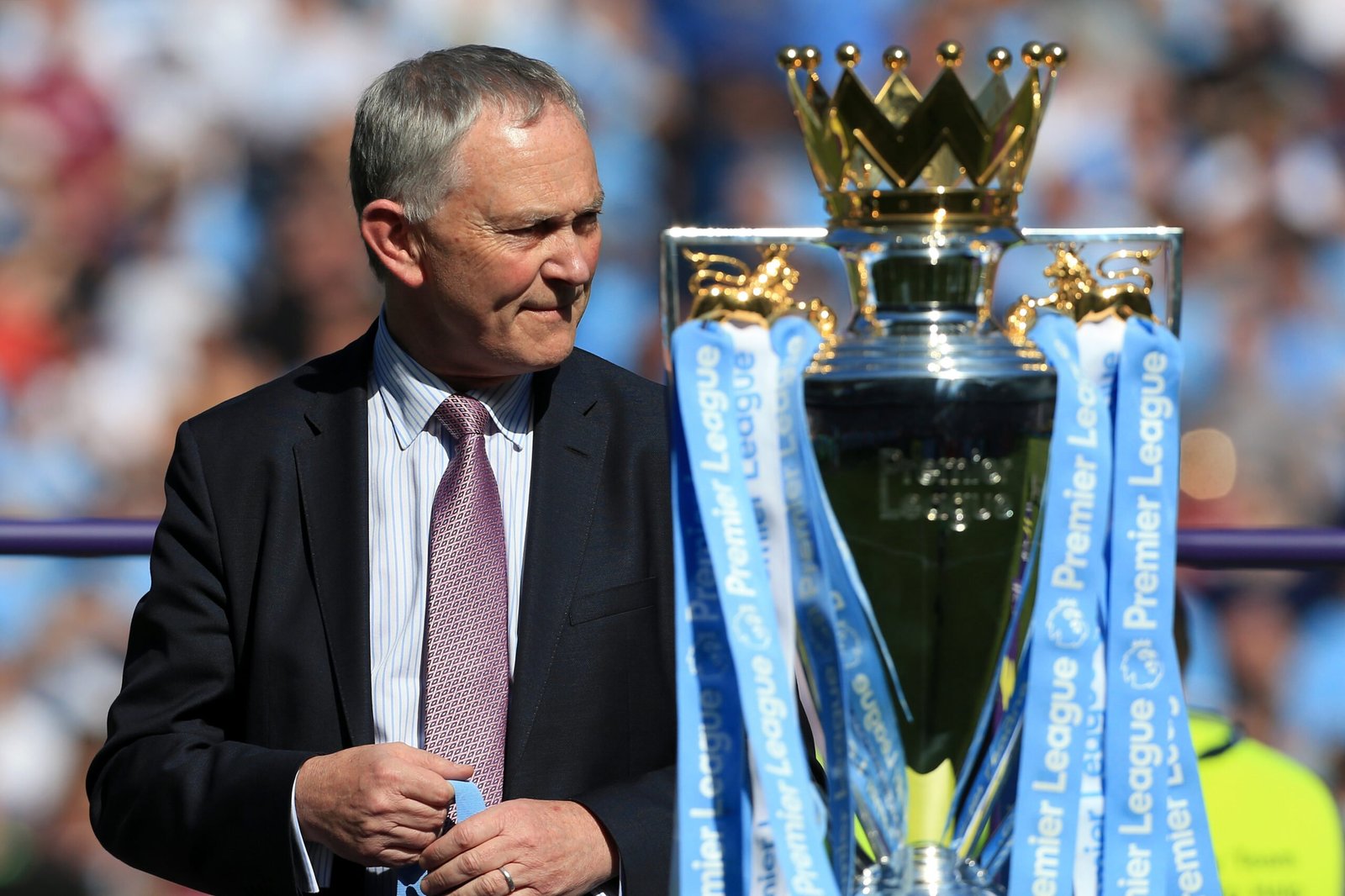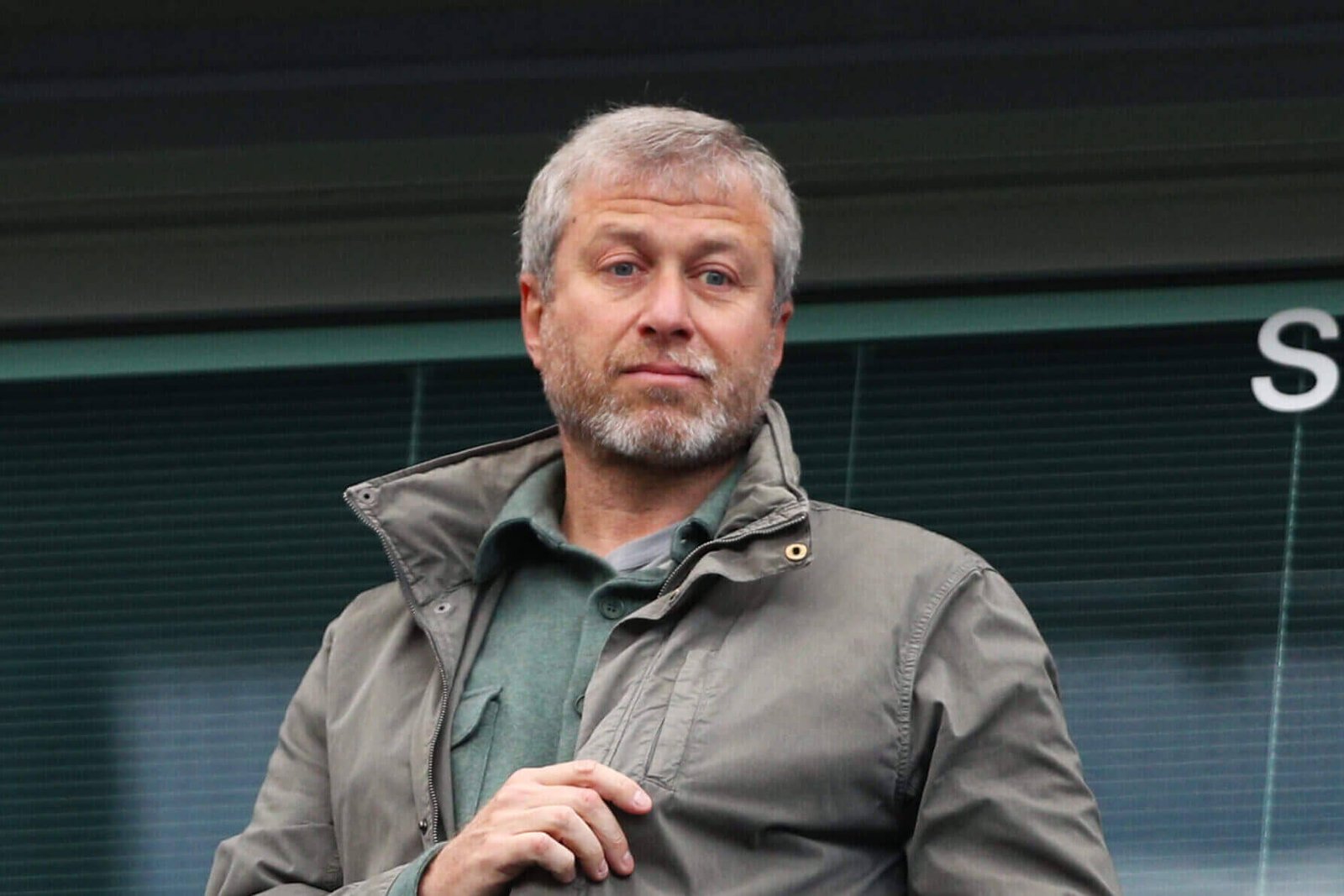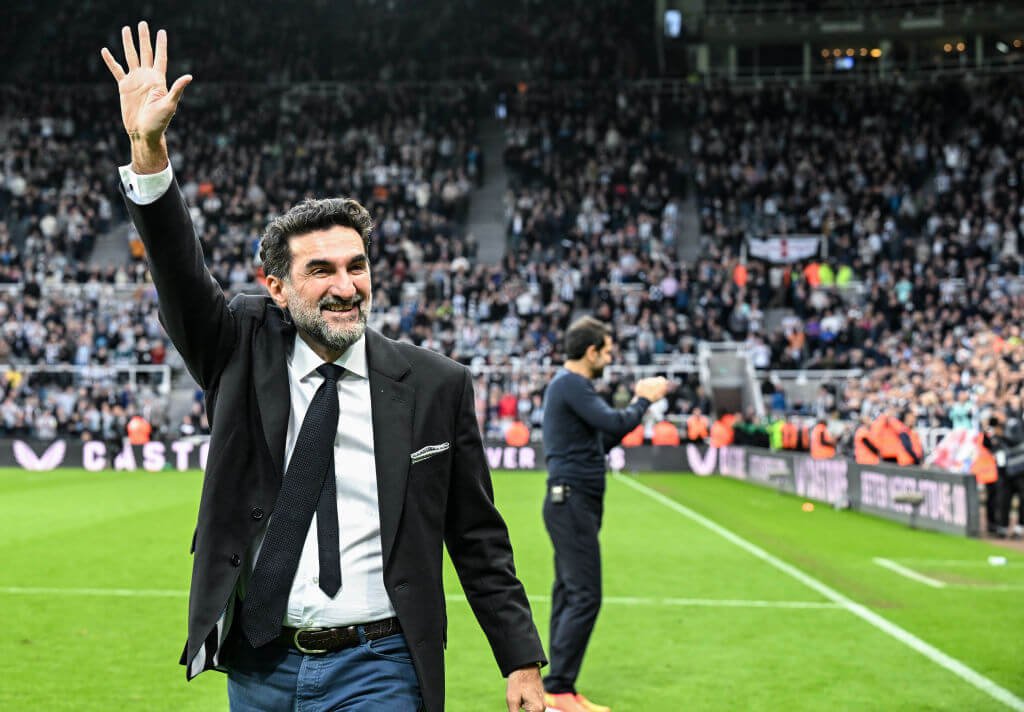A goalkeeper can play brilliantly in a game, stopping all manner of shots — but one mistake can lead to them being ridiculed, and all the saves they had made before are forgotten.
In that sense, it can often be a thankless role.
So, it is somewhat fitting that Richard Masters, the Premier League’s chief executive, used to play in goal for the league’s staff football team when they would play against sponsors’ sides, such as Nike.
“He was decent… he had the stature for it,” said a source who shared a pitch with Masters.
Masters can strike a multi-billion pound TV deal one week, lining the pockets of all 20 Premier League teams, and the very next week bear the brunt of clubs’ anger for not pushing back hard enough against an independent regulator (or for anything else they deem unjust).
Each team, driven by self-interest, has an agenda. Masters has to seek a consensus from clubs as varied as Manchester United and Luton Town, who have nothing in common beyond the division they play in.
Some clubs believe Masters is losing the room. Only last week, he informed clubs at a shareholders’ meeting in London that the Premier League is facing a possible legal battle initiated by one of its own teams against the associated party transaction rules, which aim to stop sponsorships of teams by companies linked to the same owners.
The club, believed to be Manchester City, are seeking a request for arbitration while arguing the regulations are in contravention of competition law. The Premier League’s stance is that they are fully compatible with the law.
Manchester City celebrate another Premier League title (Catherine Ivill/Getty Images)
A vote on the matter scraped through, with six teams voting against and two abstaining, meaning 12 voted in favour.
It is yet another example of in-fighting at the Premier League — but does that make Masters’ job impossible? Or does it speak to the idea that he is now unable to find a consensus among the 20 clubs?
The Athletic has spoken to multiple sources, including clubs of varying stature and those with knowledge of how Masters operates behind the scenes, to work out whether the dog is still wagging its tail or whether the tail is now wagging the dog.
All of those contacted agreed to speak on the condition of anonymity to protect relationships.
Had the Premier League not messed up its succession plan once Richard Scudamore, who had been in his role since 1999, announced his departure in 2018, then Masters would not have been promoted from managing director to chief executive.
Scudamore’s exit was seen as a significant blow, given he was the one largely responsible for turning the Premier League into the global behemoth it has become today. And it is why clubs felt compelled to each pay £250,000 ($315,000 at today’s rates) into a pot — totalling £5million — as a parting gift for what he had done and the riches he had generated for them.
Susanna Dinnage, the global president of Animal Planet, which is part of the Discovery network, was originally hired to take over in early 2019, with the nominations committee calling her “the outstanding choice”.
Dinnage, however, changed her mind and withdrew in December 2018, meaning the Premier League had to start its search again. David Pemsel, the former chief executive of the Guardian, accepted the job in October 2019 — before also resigning before starting the job following the publication of personal messages in the Sun. The Sun later apologised to Pemsel for not “accurately reflecting his position” and removed the story from its website.
This all occurred while Masters was acting as interim chief executive.
“When the recruitment process took place, Richard was very relaxed about being the interim and gave the impression he would do it for as long as required,” says a Premier League source.
“After two failed appointments, the boat hadn’t rocked too much and Masters was given it,” the source added, “and he started with credit in the bank as he had steadied the post-Scudamore era.”
Masters had the benefit of being one of the Premier League’s own in the sense of being promoted to the top job, and the staff at its headquarters in Paddington, London, are fiercely supportive and protective of him. He was a change to Scudamore’s style of management, which was viewed as slightly more rigid.

Richard Scudamore stepped aside in 2018 (Simon Stacpoole/Offside/Getty Images)
Gone was the idea that everyone had to wear a suit to work and beards weren’t allowed to grow, in came a more relaxed setting, with Masters’ early guidance being “dress for the day you’re having”.
Sources who have shared an office with Masters observed how he would not be an intimidating figure and was always open for a chat, claiming he would roam from one department to the next to see what they are up to, while also sitting himself down next to anyone in the staff canteen to eat his lunch as opposed to locking himself away in his office. He is regarded as being much more “present” than his predecessors in the role.
It was noted by staff that there was no chauffeur-driven lifestyle being led by Masters who, according to the league’s most recent set of accounts for the year ended July 31, 2022, earns £1.8million a year.
“He leaves the office with his rucksack on and in a pair of trainers to catch the train home,” a source said of Masters not being flashy.
In comparison to other executives in a similar role, and considering the global success of the Premier League, Masters is arguably underpaid. Major League Soccer’s commissioner, Don Garber, is paid a reported $5million (£4.27m) a year, and Roger Goodell, the National Football League’s commissioner, reportedly earned $63.9m annually for the 2019-20 and 2020-21 seasons.
When clubs approved his appointment in December 2019, Masters found himself walking into his first of many challenges. The Covid-19 pandemic led to the UK government bringing normal life to a halt in March 2020.
“Up until the pandemic, you had little to do with the Premier League,” said a club source. “You would turn up to the meetings, shake a few hands, have a nice drink and go home again. But during the pandemic, Richard got everyone involved and we were emboldened to make big decisions on an almost daily basis.”
At the time, Masters was praised for this collaborative approach and the Premier League emerged from the pandemic in a stronger position compared to its rivals across Europe. It led the way in terms of getting games back on and fans into stadiums.
Now, however, that initial consultative approach is viewed as the moment clubs began to grow in power. Masters’ willingness to engage on matters, setting up multiple working groups for clubs to sit on — such as a broadcast group — is designed to help increase the Premier League’s strategical advantage over its rivals. It has given them a greater insight into the inner workings and, as a consequence, a bigger say around the table.
“At the end of that process, everyone had that role and power and nobody wanted to give it up — and Richard has been unable to wrestle it back,” the club source added. “We all have our own self-interest and agendas, but Scudamore used to run it in a way where you didn’t get a choice.”
Later that year, in October 2020, Masters walked into his next challenge. This one, though, came from within: Liverpool and Manchester United plunged football into civil war, along with Rick Parry, the English Football League (EFL) chairman, as they proposed to reimagine football in the UK.
Under a slew of radical proposals, a leaked document called “Project Big Picture” suggested reducing the number of Premier League clubs from 20 to 18, ditching the Community Shield and Carabao Cup, reinventing the Championship play-off system and removing the equal voting rights in the top flight.
United and Liverpool informed their closest rivals Manchester City, Arsenal, Chelsea and Tottenham Hotspur a week before the document leaked.
“He walked into Covid-19, Project Big Picture, the Super League and Rick Parry leading a charge on EFL clubs getting more money,” said a former Premier League employee. “Trying to manage that, and keeping everyone from the clubs, fans and the government happy, is an impossible job.”
A Premier League source pointed to the notion that the top flight is no longer about running the league and signing broadcast and commercial deals, noting how the pandemic, the war in Ukraine — which led to the UK government sanctioning Russian oligarch Roman Abramovich and him selling Chelsea in May 2022 due to his ties to Vladimir Putin, as well as the league stripping him of his director status — and prolonged discussions with the government about the creation of an independent regulator have changed the landscape.

Roman Abramovich in 2016 (Paul Gilham/Getty Images)
In that sense, they say, Masters has become somewhat of a politician and needs to wear multiple hats.
Premier League factions are now far more volatile — rather than the traditional ‘Big Six’ versus the remainder, the advent of multi-club ownership models, state-owned clubs, and hedge funds means that moods shift in unpredictable tides. That makes control far more challenging to achieve.
“Despite the turbulence, he has still overseen significant growth in terms of broadcast deals,” the source said. “Clubs have been empowered more but that was needed at the time due to the issues that arose.”
The latest domestic TV deal, announced in December and running from 2025-26 to 2028-29, is worth a record £6.7billion. NBC Sports in the United States paid more than £2bn in 2021, well over double the previous agreement, to broadcast Premier League football until 2028.
As part of his consultative approach, club sources have said Masters will regularly call and discuss a variety of topics with them, canvassing different opinions to help create a league-wide consensus.
Yet those who have sat around the table at shareholders’ meetings say that consensus is evaporating, as evidenced by the vote on associated party transactions scraping through.
“Where he fails, and this isn’t the same as saying he is bad at his day job, is that he isn’t the right person to lead the Premier League from a politics standpoint,” the source said. “He wants everyone to be happy and move in the right direction, but does not deal well with confrontation.
“When you are talking about TV deals, then that absolutely is about the Premier League being great and not the clubs, but when it comes to deciding how to introduce new financial fair play rules, then that is being led by the clubs when it should be the other way.
“He is very affable at meetings, very warm… but he just doesn’t do it in the same way as Scudamore. He comes into meetings and will say, ‘This is where we are going’, and everyone just says, ‘No, we aren’t’.”
Others have disputed the claim that he does not take command of the room, noting how even though he is a warm character, he is not a pushover, pointing to the 115 charges levelled at Manchester City relating to a series of alleged breaches of financial rules, all of which the club deny, between the 2009-10 and 2017-18 seasons, Everton being docked points and charged again, along with the proposed punishments against Nottingham Forest.
Another source noted: “Finding any level of consensus around the table should be viewed as a success given all the agendas.”
That said, episodes such as his clumsiness at the UK government’s Culture, Media and Sport Committee hearing — in which he referred to Everton and Nottingham Forest as “small clubs” while discussing their financial breaches — threaten that good work. Masters clarified his comments in the aftermath, insisting that he was responding to the framing of the question, but for some clubs and their fanbases, it suggested a two-tier hierarchy.
You can argue that Masters walked into a day of reckoning with Manchester City and the pre-existing tensions between clubs up and down the table due to Scudamore’s decision to give the top sides a bigger slice of overseas broadcast income.
But the widespread anger that stemmed from Newcastle United being taken over by Saudi Arabia’s Public Investment Fund (PIF) in October 2021 is of his creation.
Emails disclosed to The Athletic involving a conversation with the Premier League and the United Kingdom’s Foreign Office revealed that the league “agreed to settle their differences” with the Saudi PIF so that the takeover could “go ahead”.
Masters had previously said there was “no pressure applied” by the UK government, as well as saying the league had “legally binding assurances” that there would be no state involvement in the running of Newcastle.
Newcastle’s chairman, Yasir Al-Rumayyan, is also the governor of the PIF and a document submitted to a U.S. court in 2023 described him as “a sitting minister of the Saudi government”. Neither Masters nor the Premier League has gone public with what the assurances they received are.

Newcastle chairman Yasir Al-Rumayyan waves to Newcastle fans last season (Serena Taylor/Newcastle United via Getty Images)
Masters is not naive enough to think that he can please every club. His critics, however, will suggest that he only charged Manchester City, Everton and Nottingham Forest to show the government the league can regulate itself and doesn’t need an independent body to take control.
The City case, in particular, will define his tenure, despite already overcoming problems as varied as Covid-19 and the European Super League. Technically, this is outside his remit and down to the independent commission — but their judgement will reflect back on him all the same.
Sides are utterly entrenched — with leadership at the Premier League frustrated that public perception, as well as that of some clubs, is still unclear on why the City investigation is taking so much longer than Everton and Nottingham Forest’s cases.
There is a sense that competing clubs cannot both have their cake and eat it — if alleged offences that are as complex as those levelled at City are to be properly investigated, that will take time.
On the flip side, City have often been cast in the role of primary agitators at Premier League meetings — with last week just one more example.
The independent commission’s eventual decision has the potential to be unprecedented in English football. The possible sanctions range from a fine to expulsion from the Premier League. City are the predominant footballing force of Masters’ time in charge with five titles in six years — and that legacy is under question.
Despite the fact Masters will not be the individual to decide any possible punishment, the eyes of the remaining Premier League clubs will fall squarely on him if they do not deem any potential sanctions severe enough.
If they collectively lose confidence and think his position as chief executive is untenable — it is worth noting the fact that 12 clubs voted in the Premier League’s favour on Friday, which suggests that isn’t yet the case — then it will be on them to wield the axe.
They would need to look no further than pages 659 and 660 of the league’s handbook, where the process of ousting Masters, or any director for that matter, is spelt out in the clearest of terms. “The members may terminate the appointment of the chair or of any director by a resolution voted by a simple majority of members entitled to vote at a general meeting,” the clause reads.
The ‘impossible job’ used to be the nickname for the England manager’s role. Gareth Southgate’s success — and the challenges faced by Masters over the last five years — means that a change of titles may be in order.
The Premier League declined to comment.
(Top photo: Alex Morton/Getty Images for Premier League)
Read the full article here


